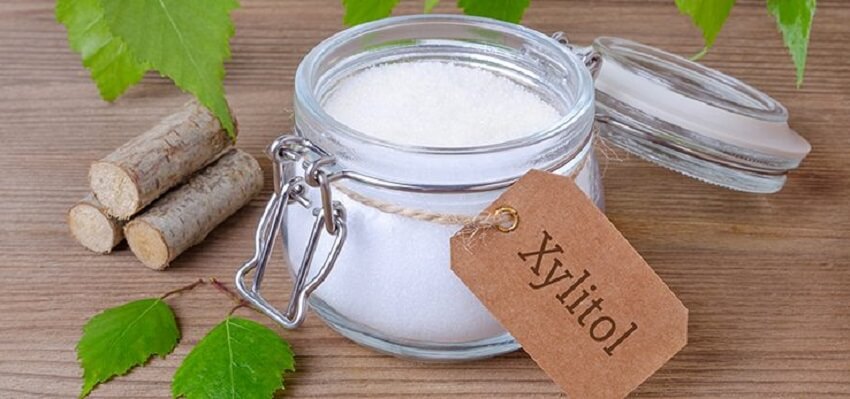Birch sugar, also known as xylitol, is one of the most widely used sugar substitutes in recent years.
Its taste, similar to that of cane sugar, its natural origin, and the low glycemic index has made it one of the first sweetener options for people with diabetes.
However, as with all sugar alternatives, it has raised questions, such as whether it is safe for health or not.
This article reviews the benefits, uses, side effects, and contraindications of birch sugar.
What is birch sugar?
Technically, birch sugar is not a sugar, but sugar alcohol, a hybrid compound between sugars and alcohol.
The digestive system can hardly digest sugar alcohols, so they are low in calories. The properties of birch sugar are comparable to those of vegetable fiber.
Birch sugar is about 40 percent lower in calories than regular sugar, providing only ten calories per teaspoon. In practice, it is a fine crystalline powder with a sweet taste.
Birch sugar uses
Birch sugar can generally be found naturally in the bark of the birch, the xylan plant, and is located in small amounts in some fruits and vegetables. However, it can also be made in a laboratory from xylose.
In industry, the uses of birch sugar are mainly a substitute for table sugar to make products suitable for diabetics or low in calories and dental products. The most common benefits of birch sugar are in the preparation of:
- Chewing gum and candy
- Ice creams
- Chocolates
- Desserts
- Jams
- Cough syrups
- Sprays sales
- Sports supplements
- Toothpaste and mouthwashes
Birch sugar benefits
Birch sugar has potential health benefits. First, it can help improve dental health. This is one of the benefits accepted by most dentists and researchers. It has also been confirmed that it practically does not alter blood insulin levels, making it an excellent alternative for people with diabetes. The benefits of birch sugar are:
- Help prevent cavities
One of the benefits of birch sugar is that it can help prevent cavities; unlike sugar, it cannot be metabolized by bacteria in the mouth. This means that it can benefit the microbes that live in the mouth.
In a study where sorbitol (Splenda) was compared with birch sugar, the latter has been confirmed to have a more significant anticaries effect. The participants who consumed birch sugar had 27% fewer cavities than the sorbitol group. This experiment also concluded that birch sugar positively impacts permanent teeth. (2)
- Has prebiotic effects
Birch sugar can feed the friendly bacteria in your gut, so one of the benefits is having a prebiotic effect.
In particular, studies suggest that xylitol stimulates the growth and metabolic activity of Anaerostipes spp. in the human colon. A microorganism with known health benefits. (3,4)
- Regulate blood sugar levels
The glycemic index of birch sugar is about seven units, while table sugar is approximately 60-70 units. Products with a low glycemic index are ideal for regulating blood sugar levels in people with diabetes, prediabetes, and other metabolic disorders.
In moderate amounts, birch sugar is one of the ideal sugar alternatives to control blood glucose peaks. The maximum recommended dose to obtain this benefit is about 7-8 g per day. When it comes to losing weight, studies that have evaluated the effects of birch sugar are still inconclusive. (5)
Side effects and contraindications
Birch sugar is considered safe for most people. However, digestive side effects can appear in some cases, mainly when consumed excessively.
Sugar alcohols can carry water into the intestine or ferment with intestinal bacteria. This can lead to mild side effects such as gas, bloating, and diarrhea. (6)
Avoid birch sugar and other sugar alcohols if you have colon syndrome or irritable bowel.
If you have never tried birch sugar, eating more than 10-20 grams per day is not recommended. After adaptation, an average adult can tolerate up to 20-70g per day with no side effects. For children, the maximum recommended amount is 20 grams.
However, there is enough evidence to say that if you consume birch sugar in moderate amounts, it is likely that you will not experience any severe side effects, both long-term and short-term.
The possible side effects of birch sugar are:
- gases
- swelling
- diarrhea
- naúseas
Contraindications of birch sugar are:
- people with irritable bowel syndrome
- ulcers and other gastrointestinal problems
- allergies to xylitol
Birch sugar is dangerous for dogs.
Birch sugar can be highly toxic to dogs and other animals.
Unlike humans, when dogs eat birch sugar, their bodies mistake it for glucose and begin to produce large amounts of insulin.
The dog’s cells then absorb glucose from the bloodstream, leading to severe hypoglycemia and death. (7)
Besides causing hypoglycemia in dogs, other symptoms of birch sugar poisoning in animals are vomiting, low physical activity, and seizures.
In July 2019, the FDA issued a warning to pet owners regarding the dangers of dogs and birch sugar (xylitol). The statement aimed to sensitize canine pet owners in the hope that they will be more careful when exposing their pets to products with birch sugar in their composition, such as gum, candy, and toothpaste.
In addition to keeping gum away from pets, read your pet’s food labels and never feed leftover food containing birch sugar to pets.
Birch sugar vs. stevia
Stevia is one of the natural products with greater sweetening power, 200 times more than white sugar. In 2008, the FDA included it in its list of additives allowed in the food and drug industry.
Both sugar substitutes: birch sugar and stevia, are low in calories and natural, so they are considered the best options for people with diabetes. They have practically no side effects and contraindications in moderate amounts, so they are considered safe for health.
Most people do well with both stevia and birch sugar. However, if you opt for stevia, ensure it is not laced with sugar or other sweeteners that alter insulin levels.
As a downside, some people tend to notice a slightly bitter taste in stevia. This is due to the presence of some compounds found in the plant. Manufacturers are doing their best to extract them and eliminate the bitter taste. (2)
Is birch sugar allowed on the ketogenic diet?
Another potential benefit of birch sugar is that it is considered low in net carbs.
While birch sugar does provide some carbohydrates and a low number of calories, these should not interfere with your ability to enter ketosis, assuming you are eating in low amounts.
In other words, birch sugar is an allowed ingredient in low-carb diets, such as the ketogenic diet.
ABSTRACT
- Birch sugar is a low-calorie sugar substitute.
- Its main benefits are preventing cavities and regulating blood sugar levels in people with diabetes.
- Consuming birch sugar is considered safe for most people; there are no known severe long-term side effects.
- If consumed excessively (more than 20 grams in a single intake), it can cause diarrhea. So it is not recommended for people with irritable bowel syndrome.
- Birch sugar is highly toxic to dogs.
- Like other sugar alcohols, it is low in calories and net carbs, so it is allowed on the ketogenic diet.







